Module 3 Heroes 词汇精讲课件(58张PPT))
文档属性
| 名称 | Module 3 Heroes 词汇精讲课件(58张PPT)) |  | |
| 格式 | pptx | ||
| 文件大小 | 14.3MB | ||
| 资源类型 | 教案 | ||
| 版本资源 | 外研版 | ||
| 科目 | 英语 | ||
| 更新时间 | 2021-07-21 10:31:50 | ||
图片预览

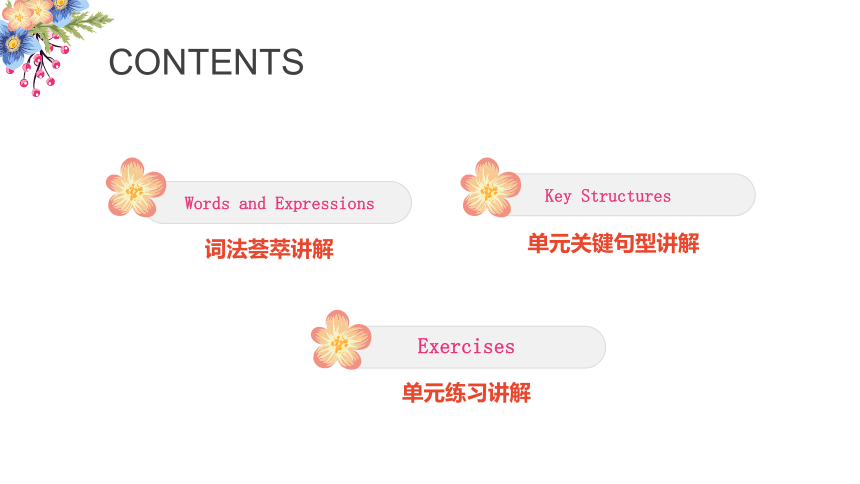

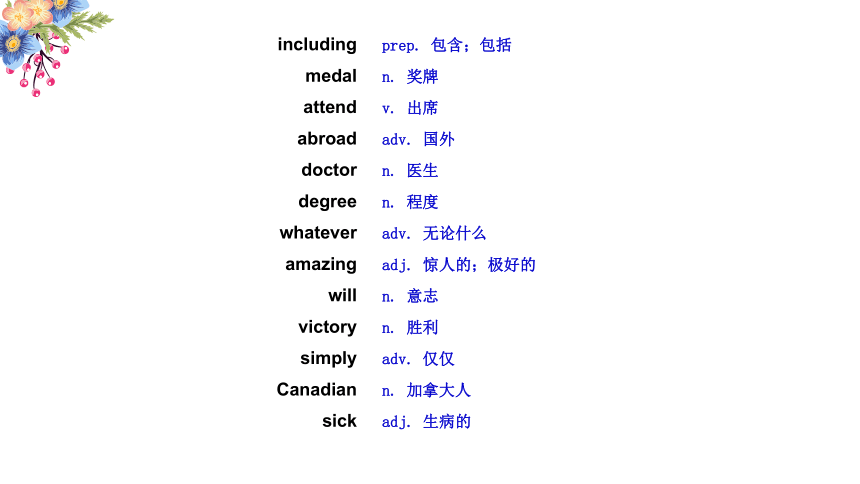
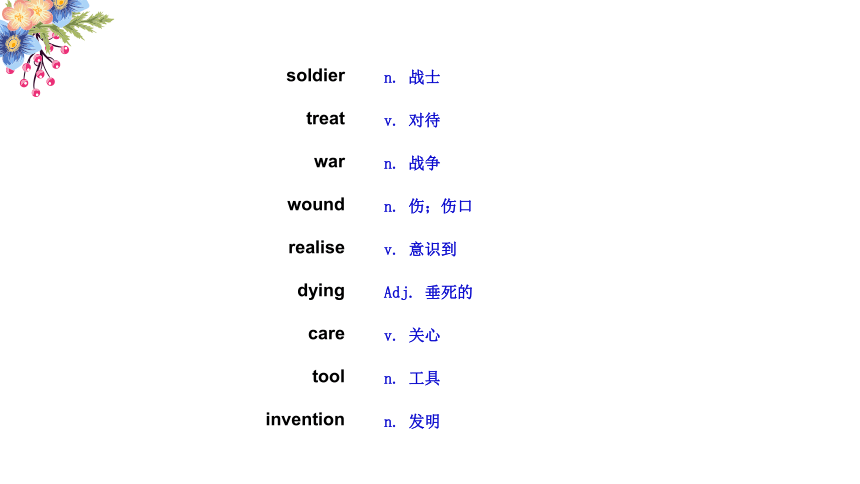
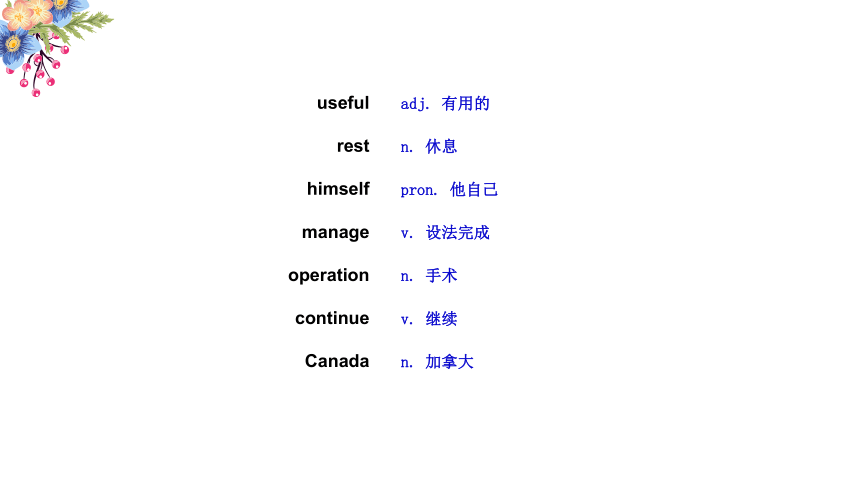
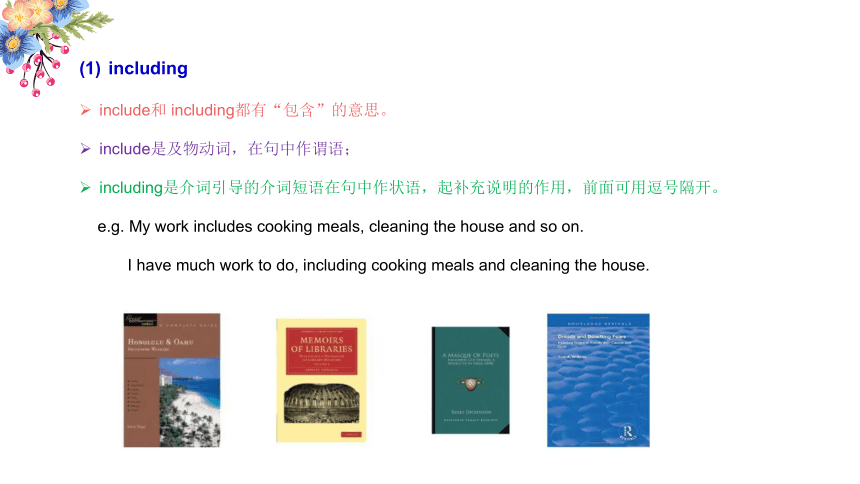
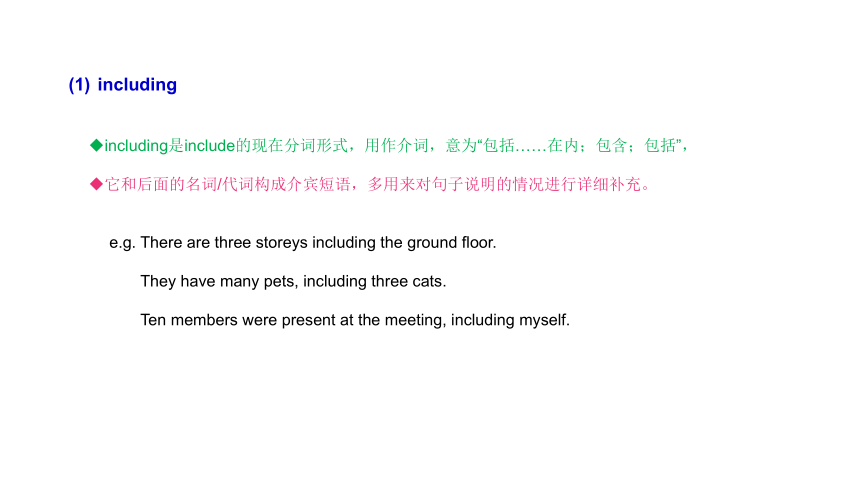
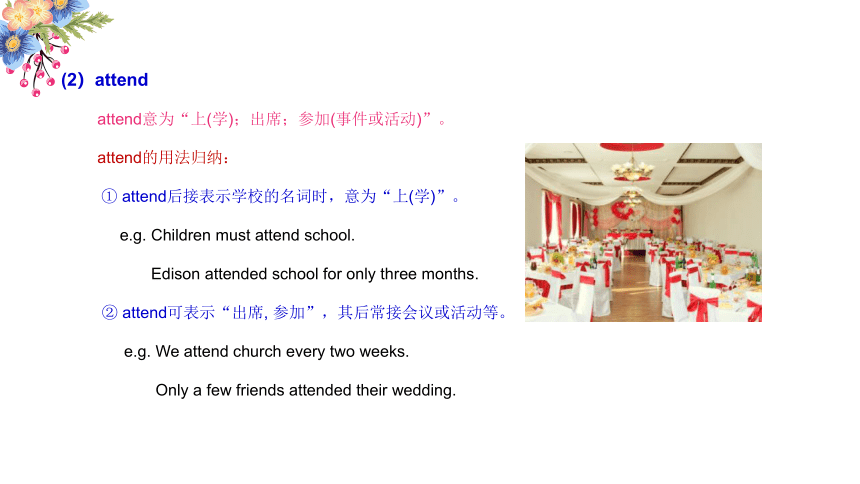
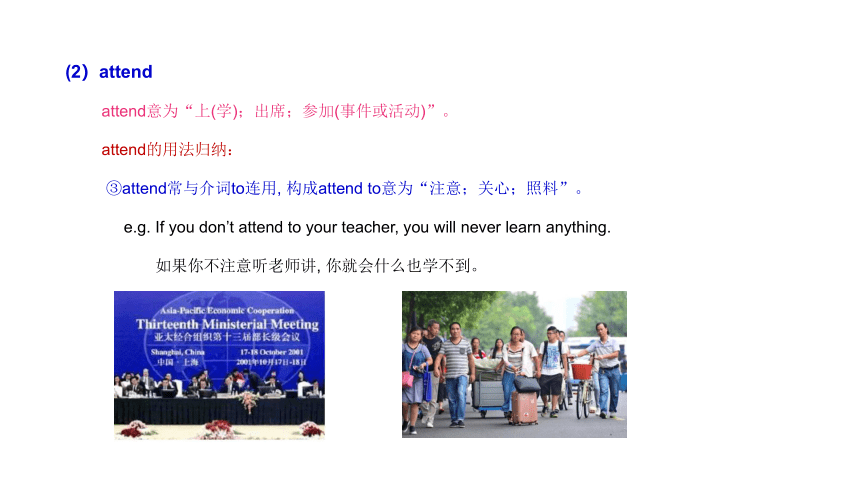
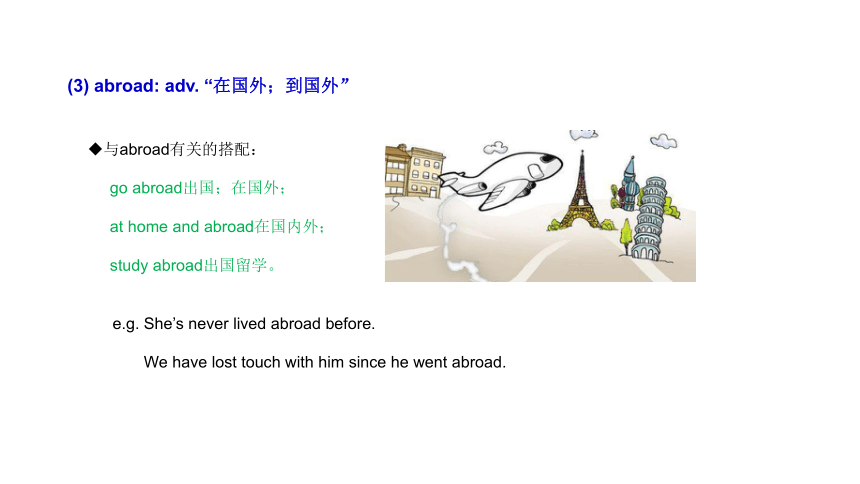
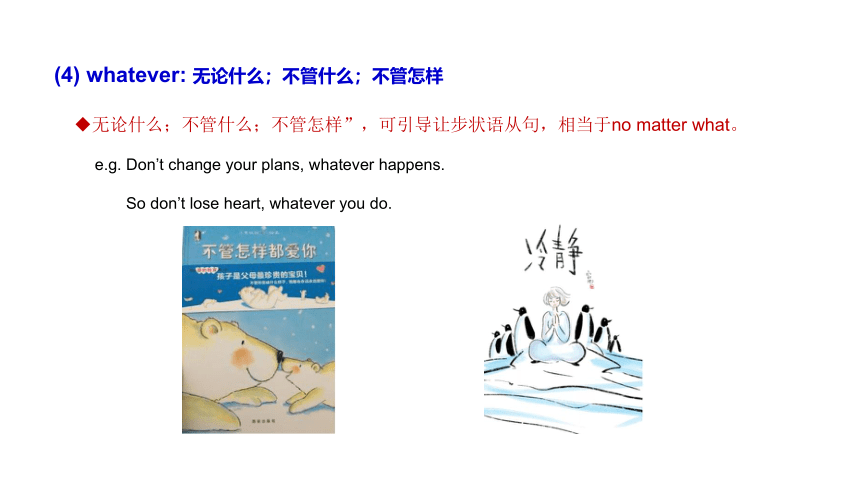
文档简介
外研版九年级上册词汇讲解
Module 3 Heroes
外研版9年级上册
词法荟萃讲解
Words and Expressions
单元关键句型讲解
Key Structures
CONTENTS
Exercises
单元练习讲解
01
Words and Expressions
including
medal
attend
abroad
doctor
degree
whatever
amazing
will
victory
simply
Canadian
sick
prep. 包含;包括
n. 奖牌
v. 出席
adv. 国外
n. 医生
n. 程度
adv. 无论什么
adj. 惊人的;极好的
n. 意志
n. 胜利
adv. 仅仅
n. 加拿大人
adj. 生病的
soldier
treat
war
wound
realise
dying
care
tool
invention
n. 战士
v. 对待
n. 战争
n. 伤;伤口
v. 意识到
Adj. 垂死的
v. 关心
n. 工具
n. 发明
useful
rest
himself
manage
operation
continue
Canada
adj. 有用的
n. 休息
pron. 他自己
v. 设法完成
n. 手术
v. 继续
n. 加拿大
including
include和 including都有“包含”的意思。
include是及物动词,在句中作谓语;
including是介词引导的介词短语在句中作状语,起补充说明的作用,前面可用逗号隔开。
e.g. My work includes cooking meals, cleaning the house and so on.
I have much work to do, including cooking meals and cleaning the house.
including
including是include的现在分词形式,用作介词,意为“包括……在内;包含;包括”,
它和后面的名词/代词构成介宾短语,多用来对句子说明的情况进行详细补充。
e.g. There are three storeys?including?the ground floor.
They have many pets,?including?three cats.??
Ten members were present at the meeting, including myself.
(2)attend
attend意为“上(学);出席;参加(事件或活动)”。
attend的用法归纳:
① attend后接表示学校的名词时,意为“上(学)”。
e.g. Children must?attend?school.
Edison attended school for only three months.
② attend可表示“出席, 参加”,其后常接会议或活动等。
e.g. We?attend?church every two weeks. ?
Only a few friends attended their wedding.
(2)attend
attend意为“上(学);出席;参加(事件或活动)”。
attend的用法归纳:
③attend常与介词to连用, 构成attend to意为“注意;关心;照料”。
e.g. If you don’t attend to your teacher, you will never learn anything.
如果你不注意听老师讲, 你就会什么也学不到。
(3) abroad: adv. “在国外;到国外”
与abroad有关的搭配:
go abroad出国;在国外;
at home and abroad在国内外;
study abroad出国留学。
e.g. She’s never lived abroad before.
We have lost touch with him since he went abroad.
(4) whatever: 无论什么;不管什么;不管怎样
无论什么;不管什么;不管怎样”,可引导让步状语从句,相当于no matter what。
e.g. Don’t change your plans, whatever happens.
So don’t lose heart, whatever you do.
(4) whatever: 无论什么;不管什么;不管怎样
【拓展】可引导让步状语从句的词:
whenever=no matter when“无论何时”;
however=no matter how“无论怎样”;
wherever=no matter where“无论何地”;
whoever=no matter who“无论谁”;
whichever=no matter which“无论哪一个”。
(5) amazing
amazing与amazed的用法辨析:
① amazing作形容词,意为“惊人的,极好的,令人吃惊的”,常用来修饰“事物” ;
多以物作主语或修饰事物,说明事物本身的特性。
e.g. He has?amazing?knowledge.
② amazed做形容词,意为“感到惊奇的,吃惊的”,多以人作主语或修饰人,说明人因外部
原因而产生的某种情绪感受。短语be amazed at...指“对……大为惊奇”。
e.g. I am amazed at what he said. 我对他说的话大为惊奇。
(5) amazing
【拓展】“-ing形容词”与“-ed形容词”的用法辨析:
① -ing形容词表示主动意义,多指事物对人的影响,含有“令人……”之意;
可作表语,也可作定语修饰名词,多以物作主语或修饰事物,说明事物本身的特性。
e.g. The news is very exciting. 这个消息令人兴奋。
This is an exciting story. 这是一个令人兴奋的故事。
(5) amazing
【拓展】“-ing形容词”与“-ed形容词”的用法辨析:
②-ed形容词表示被动意义,多指人对事物的感受,含有“感到……”之意,
多以人作主语或修饰人,说明人因外部原因而产生的某种情绪感受。
常用于“sb.+-ed形容词+介词”结构。
e.g. He had a pleased smile on his face. 他脸上露出了满意的微笑。
He told me the news in a very excited voice. 他声音很激动地告诉了我这个消息。
(5) amazing
【拓展】“-ing形容词”与“-ed形容词”的用法辨析:
③常见的以-ing 和-ed 结尾的同根形容词:
interesting, interested;boring,bored;frustrating,frustrated;tiring,tired;
surprising,surprised。
e.g. He is amazed at the amazing news.
This book is very interesting so I’m interested in it.
(6) Will n. “意志;决心”
e.g. Where there’s a will, there’s a way. 有志者事竟成。
【拓展】will的用法归纳:
① will作名词,意为“意志;决心”。
e.g. Maybe this is God’s will.
② will作助动词,意为“将,将会;会,要”,表示将来的动作或状态后接动词原形。
e.g. He will go to America tomorrow.
③ will用于一些祈使句的附加疑问句。
e.g. Let us go to the movies, will you?
(7) sick: adj. 生病的
ill?与sick的用法辨析:ill?和sick都有“生病的;有病的”之意,但用法并不完全相同。?
?
① ill?意为“生病的;有病的”,一般用作表语,不能作定语。
e.g. The little child is ill.
My mother feels ill.
② sick?意为“生病的;(感觉)不适的”,既可作表语又可作定语。
e.g. a sick man (一个病人)
She is sick in bed. 她卧病在床。
(8) treat: v. 医治;治疗
cure与treat的用法辨析:
① treat意为“医治;治疗”,通常强调过程,指对病人进行诊断和治疗,但不含治好的意思。
e.g. The dentist will?treat?my tooth.??
The doctors were not able to?treat?this disease.??
Which doctor is treating you for your illness?
② cure意为“医治;治疗”,通常强调结果,指治愈某种疾病或某人的疾病。
e.g. The doctors cured her of cancer.
(9) dying: adj 垂死的
e.g. She takes care of the dying man carefully.
The little girl cried when she saw her?dying?cat.
be dying for 渴望
e.g. I am dying for the present.(我非常渴望有那份礼物).
(9) dying: adj 垂死的
【拓展】
die是动词,意为“死;枯竭”;
dead是形容词,意为“死的”;
death是名词,意为“死;死亡”。
(10) manage v.(设法)完成
【辨析】manage to do sth.,try to do sth.与try doing sth.的用法辨析:
① manage to do sth.意为“设法做成某事”,强调结果,事情已经成功,相当于succeed?in?doing sth.。
e.g. The box was heavy but he managed to carry it.
He managed to send the tourists to the airport in time.?
② try to do sth.意为“努力/设法/试图/尽力去做某事”,强调过程,能否成功不确定。
e.g. We’ll try to improve our teaching methods.
We tried to stop him smoking in bed but he would do it.
(10) manage v.(设法)完成
【辨析】manage to do sth.,try to do sth.与try doing sth.的用法辨析:
③ try doing sth.意为“试着做某事”,表示抱着试试看的想法去做。
e.g. Let’s try knocking at the back door. Maybe he is sleeping.
You’d better try carrying out the experiment in another way.
(11) continue: 继续
① continue to do sth.意为“继续做另外一件事情(已经做完某件事情)”,是做完一件事继续做另一件事。
e.g. After he finished reading a novel, he continued to play games with his friends.
② continue doing sth.意为“继续做某一件事情(还没做完)”,是继续做刚才没做完的那件事。
e.g. I continue doing my homework because I haven’t finished it yet.
once again
give up
die for
take care of
at that time
on one’s own
die of
再一次
放弃
为…而死
照顾
在那时
独自一人
死于…
choose to do sth.
play table tennis
tell sb. about sth.
start doing sth.
gold medals
stop doing sth.
attend university
at one point
in space
选择做某事
打乒乓球
告诉某人某事
开始做某事
金牌
停止做某事
上大学
有一次
在太空
take off
on earth
around the world
set off
on one’s way (to)
get away
wait for sb. to do sth.
save sb. from sb.
be trained as
return to
起飞
在世界上;在地球上
全世界
出发;动身;启程
在某人(去……)的路上
离开
等待某人做某事
从某人那里救出某人
被训练成为
返回到
give up放弃
【填一填 思维激活】
①整天玩电脑游戏对你的健康有害。你应该放弃它。
Playing computer games all day is bad for your health. You should__________ ___________ _________.
②你应该戒烟。
You should_________ ___________ __________.
give it up
give up smoking
【记一记 知识构建】
give up的用法
(1)give up是动副短语, 后接代词作宾语时, 必须放在两词中间。
(2)give up后接动词时需用动词的-ing形式, 相当于stop doing sth. 。
【归纳拓展】give的相关短语
【练一练 走近中考】
He failed to break the world record for long jump many times, but he never ______his hope.
A. took off B. put away C. gave up D. turned down
---Diaoyu Island belongs to China.
—Surely it does! We Chinese will never ______it up.
A. cut B. fix C. give D. set
die for
“为……而死;为……而献身”
e.g. He is willing to die for the people.
(2) “渴望……;向往……;急需(某物)”,表示强烈的语气。
e.g. I’m dying for a cup of tea.
at that time: 在那时
相当于at the time,常与一般过去时或过去进行时连用。
e.g. At that time, I was swimming with my friends.
At that time, China did not yet have nuclear weapon.
at that time: 在那时
【拓展】与time有关的常用搭配:
at a time每次;依次;
at one time一度;从前;
at all times随时;总是;
at times有时;间或;
all the time一直。
on one’s own: 独自
on one’s own 意为“独立地;单独地;独自地”,一般用作状语,相当于alone或by oneself。
own作形容词,意为“自己的;本人的”,常放在形容词性物主代词或名词所有格的后面。
e.g. I made this bookshelf all on my own/by myself.
She’s been living on her own/by herself for ten years.
He left his hometown on his own when he was twelve years old.
on one’s own: 独自
【拓展】
of one’s own意为“属于某人自己的”,一般用作定语。own还可作动词,意为“有;拥有”。
e.g. He’d like a house of his own.
His father owns a local pub.
【辨析】die of与die?from?的用法辨析:
① die of意为“死于……”,指死于疾病,衰老,感情,饥寒等内在原因。
e.g. His father died of cancer yesterday.
② die?from?意为“死于……”,指死于外伤、事故、劳累过度等外在原因。
e.g. The old man died from a traffic accident. 那位老人死于交通事故。
die of
02
Key structures
choose to do sth. 意为“选择做某事”。
choose是动词,意为“选择,挑选”,其过去式和过去分词分别是chose和chosen。
其名词形式为choice意为“选择”。常用词组make one’s choice意为“做选择”;
have no choice but to do sth.意为“除了……别无选择”。
e.g. I choose to tell him the truth.
We each had to make a choice.
I have no choice but to accept his invitation.
Who have you chosen to tell us about? 你要选择谁来讲述呢?
【辨析】stop doing sth.与stop to do sth. 的用法辨析:
① stop doing sth.意为“停止做某事”,表停止正在做的事情。
e.g. Let’s stop having a rest.
The two girls stopped talking when they saw me.
② stop to do sth. 意为“停下来去做某事”,即停止正在做的事,而去做另一件事。
不定式为stop的目的状语。
e.g. Let’s stop to have a rest.
The two girls stopped to talk to me when they saw me.
She stopped playing when she was twenty- four. 她24岁时退役。
Her English wasn’t good enough when she began. 刚开始的时候,她的英语并不好。
enough的用法:
① enough作形容词,意为“足够的;充分的”,修饰名词,作定语,可放在名词前,也可放
在名词后:“enough+名词”或“名词+enough”,后常跟介词for或动词不定式。
e.g. I’ve got enough money to pay for the taxi.
I have enough time/ time enough to do the work.
Her English wasn’t good enough when she began. 刚开始的时候,她的英语并不好。
enough的用法:
②enough作副词,意为“足够地;充分地”,修饰形容词或副词,表示程度,要放在形容词
或副词后面:形容/副词+enough,后常跟介词for或动词不定式。
e.g. The boy is old enough to do to school.
The little girl runs fast enough to catch up with her brothers.
Her English wasn’t good enough when she began. 刚开始的时候,她的英语并不好。
enough的用法:
③enough用作名词或代词,作主语或宾语,后跟的名词前有冠词、形容词性物主代词、指示
代词时,要加介词of。
e.g. Enough has been said on this subject.
I’ve had enough of you! You are so noisy!
His inventions saved many lives. 他的发明挽救了许多人的生命。
save作及物动词,意为“拯救;挽救;救助”,后接名词或代词作宾语。常用短语save one’s life意为“挽救某人的生命”。
e.g. We must do all we can to save the patient.
After Xiao Yueyue was sent to hospital, many people tried to save her life.
His inventions saved many lives. 他的发明挽救了许多人的生命。
【拓展】save 表示“节省;节约”,后接名词、代词或双宾语。
save sth. for sb.意为“为某人节省某物”;
save还可表示“储存”,既可作及物动词,也可作不及物动词。
e.g. Machines can save labour.
Your kind help saved me lots of trouble.
He has never saved.
I saved part of my salary each month.
On 12th April 1961, Gagarin took off for space. 1961年4月12日,加加林乘坐宇宙飞船前往太空。
take off意为“(飞机)起飞”,是动词短语。
e.g. Can you go and find when the plane to New York takes off?
【拓展】
take off还可表示“脱下;取下”,此时它的反义词为put on意为“穿上”。
e.g. Put on your coat. Don’t take it off.
He took off his raincoat and took out the key.
ten more years意为“另外的十年”。“数词+more+名词复数”,意为“另外的若干……”;
more作形容词,意为“另外的;附加的”,可跟在数词的后面,再接可数名词复数。
基数词与more连用时,表示在已有基础上再增加一定数量。
e.g. Three more of the missing climbers have been found.
After ten years of fighting and ten more years on the way home, Odysseus completes his journey and manages to get back to his own country, alone. 经过十年的战斗和十多年地返乡之路,奥德修斯完成了他的旅程,并设法独自回到自己的国家。
【拓展】“another+数词+名词复数”,意为“另外的若干……”。another作形容词,意为
“另外的;附加的”,用在数词的前面,再接可数名词复数。
基数词与another连用时,表示在已有基础上再增加一定数量。
e.g. They drove for another three hours. 他们又行驶了3个小时。
The strike may last another six weeks. 罢工可能还要持续六个礼拜。
After ten years of fighting and ten more years on the way home, Odysseus completes his journey and manages to get back to his own country, alone. 经过十年的战斗和十多年地返乡之路,奥德修斯完成了他的旅程,并设法独自回到自己的国家。
return to意为“返回到”,相当于get back to,其中return是不及物动词,意为“返回;归来”,
后接地点副词时,不加to。
e.g. When did you return home?
Bob returned to Paris yesterday evening.
When she returned to Britain in 1856, she became a national hero. 当她在1856年返回英国时,她变成了国家英雄。
03
Exercise
1. Tony’s father worked for 48 hours without _____?
A. stop B. stops C. stopped D. stopping
2. My English teacher often encourages us _______ hard.
A. to study B. studying C. studies D. studied
3. He often makes his sister ____.
A. laugh B. laughing C. to laugh D. laughs
4. — Which team will the Chinese football team play_____?
— The Korean team.
A. for B. on C. against D. at
5. Many people are dying because they didn’t get to hospital_____?
A. quick enough B. enough quick
C. quickly enough D. enough quickly
6.China is famous _________ its tea and china.
A. with B. in C. of D. for
7. Don’t throw away the waste paper. It needs _________ so that it can be reused.
A. to destroy B. destroying C. to collect D. collecting
8.Tom was busy taking a training class,________ we had to wait for him for half an hour.
A. so B. if C. or D. but
9. I met him ________ the way to school.
A. on B. in C. to D. by
10. The plane _________ ten minutes ago.
A. put off B. set off C. took off D. turned off
11. Luckily, nobody __________ in the car accident yesterday.
A. injure B. hurt C. was cut D. was hurt
12. I don’t think he will come back on time,_________?
A. do I B. will he C. won’t he D. don’t I
13. The plane landed ________ in the end. All the people shouted happily.
A. safe B. safety C. safely D. possible
14. It’s too hot in the room. Please keep the door ________.
A. opening B. open C. opened D. to open
15. He can hardly move at all,_________?
A. can’t he B. can he C. don’t he D. do he
1. Tony’s father worked for 48 hours without _____?
A. stop B. stops C. stopped D. stopping
2. My English teacher often encourages us _______ hard.
A. to study B. studying C. studies D. studied
3. He often makes his sister ____.
A. laugh B. laughing C. to laugh D. laughs
4. — Which team will the Chinese football team play_____?
— The Korean team.
A. for B. on C. against D. at
5. Many people are dying because they didn’t get to hospital_____?
A. quick enough B. enough quick
C. quickly enough D. enough quickly
D
A
A
C
C
6.China is famous _________ its tea and china.
A. with B. in C. of D. for
7. Don’t throw away the waste paper. It needs _________ so that it can be reused.
A. to destroy B. destroying C. to collect D. collecting
8.Tom was busy taking a training class,________ we had to wait for him for half an hour.
A. so B. if C. or D. but
9. I met him ________ the way to school.
A. on B. in C. to D. by
10. The plane _________ ten minutes ago.
A. put off B. set off C. took off D. turned off
D
D
A
A
C
11. Luckily, nobody __________ in the car accident yesterday.
A. injure B. hurt C. was cut D. was hurt
12. I don’t think he will come back on time,_________?
A. do I B. will he C. won’t he D. don’t I
13. The plane landed ________ in the end. All the people shouted happily.
A. safe B. safety C. safely D. possible
14. It’s too hot in the room. Please keep the door ________.
A. opening B. open C. opened D. to open
15. He can hardly move at all,_________?
A. can’t he B. can he C. don’t he D. do he
D
B
C
B
B
感谢您的观看
Module 3 Heroes
外研版9年级上册
词法荟萃讲解
Words and Expressions
单元关键句型讲解
Key Structures
CONTENTS
Exercises
单元练习讲解
01
Words and Expressions
including
medal
attend
abroad
doctor
degree
whatever
amazing
will
victory
simply
Canadian
sick
prep. 包含;包括
n. 奖牌
v. 出席
adv. 国外
n. 医生
n. 程度
adv. 无论什么
adj. 惊人的;极好的
n. 意志
n. 胜利
adv. 仅仅
n. 加拿大人
adj. 生病的
soldier
treat
war
wound
realise
dying
care
tool
invention
n. 战士
v. 对待
n. 战争
n. 伤;伤口
v. 意识到
Adj. 垂死的
v. 关心
n. 工具
n. 发明
useful
rest
himself
manage
operation
continue
Canada
adj. 有用的
n. 休息
pron. 他自己
v. 设法完成
n. 手术
v. 继续
n. 加拿大
including
include和 including都有“包含”的意思。
include是及物动词,在句中作谓语;
including是介词引导的介词短语在句中作状语,起补充说明的作用,前面可用逗号隔开。
e.g. My work includes cooking meals, cleaning the house and so on.
I have much work to do, including cooking meals and cleaning the house.
including
including是include的现在分词形式,用作介词,意为“包括……在内;包含;包括”,
它和后面的名词/代词构成介宾短语,多用来对句子说明的情况进行详细补充。
e.g. There are three storeys?including?the ground floor.
They have many pets,?including?three cats.??
Ten members were present at the meeting, including myself.
(2)attend
attend意为“上(学);出席;参加(事件或活动)”。
attend的用法归纳:
① attend后接表示学校的名词时,意为“上(学)”。
e.g. Children must?attend?school.
Edison attended school for only three months.
② attend可表示“出席, 参加”,其后常接会议或活动等。
e.g. We?attend?church every two weeks. ?
Only a few friends attended their wedding.
(2)attend
attend意为“上(学);出席;参加(事件或活动)”。
attend的用法归纳:
③attend常与介词to连用, 构成attend to意为“注意;关心;照料”。
e.g. If you don’t attend to your teacher, you will never learn anything.
如果你不注意听老师讲, 你就会什么也学不到。
(3) abroad: adv. “在国外;到国外”
与abroad有关的搭配:
go abroad出国;在国外;
at home and abroad在国内外;
study abroad出国留学。
e.g. She’s never lived abroad before.
We have lost touch with him since he went abroad.
(4) whatever: 无论什么;不管什么;不管怎样
无论什么;不管什么;不管怎样”,可引导让步状语从句,相当于no matter what。
e.g. Don’t change your plans, whatever happens.
So don’t lose heart, whatever you do.
(4) whatever: 无论什么;不管什么;不管怎样
【拓展】可引导让步状语从句的词:
whenever=no matter when“无论何时”;
however=no matter how“无论怎样”;
wherever=no matter where“无论何地”;
whoever=no matter who“无论谁”;
whichever=no matter which“无论哪一个”。
(5) amazing
amazing与amazed的用法辨析:
① amazing作形容词,意为“惊人的,极好的,令人吃惊的”,常用来修饰“事物” ;
多以物作主语或修饰事物,说明事物本身的特性。
e.g. He has?amazing?knowledge.
② amazed做形容词,意为“感到惊奇的,吃惊的”,多以人作主语或修饰人,说明人因外部
原因而产生的某种情绪感受。短语be amazed at...指“对……大为惊奇”。
e.g. I am amazed at what he said. 我对他说的话大为惊奇。
(5) amazing
【拓展】“-ing形容词”与“-ed形容词”的用法辨析:
① -ing形容词表示主动意义,多指事物对人的影响,含有“令人……”之意;
可作表语,也可作定语修饰名词,多以物作主语或修饰事物,说明事物本身的特性。
e.g. The news is very exciting. 这个消息令人兴奋。
This is an exciting story. 这是一个令人兴奋的故事。
(5) amazing
【拓展】“-ing形容词”与“-ed形容词”的用法辨析:
②-ed形容词表示被动意义,多指人对事物的感受,含有“感到……”之意,
多以人作主语或修饰人,说明人因外部原因而产生的某种情绪感受。
常用于“sb.+-ed形容词+介词”结构。
e.g. He had a pleased smile on his face. 他脸上露出了满意的微笑。
He told me the news in a very excited voice. 他声音很激动地告诉了我这个消息。
(5) amazing
【拓展】“-ing形容词”与“-ed形容词”的用法辨析:
③常见的以-ing 和-ed 结尾的同根形容词:
interesting, interested;boring,bored;frustrating,frustrated;tiring,tired;
surprising,surprised。
e.g. He is amazed at the amazing news.
This book is very interesting so I’m interested in it.
(6) Will n. “意志;决心”
e.g. Where there’s a will, there’s a way. 有志者事竟成。
【拓展】will的用法归纳:
① will作名词,意为“意志;决心”。
e.g. Maybe this is God’s will.
② will作助动词,意为“将,将会;会,要”,表示将来的动作或状态后接动词原形。
e.g. He will go to America tomorrow.
③ will用于一些祈使句的附加疑问句。
e.g. Let us go to the movies, will you?
(7) sick: adj. 生病的
ill?与sick的用法辨析:ill?和sick都有“生病的;有病的”之意,但用法并不完全相同。?
?
① ill?意为“生病的;有病的”,一般用作表语,不能作定语。
e.g. The little child is ill.
My mother feels ill.
② sick?意为“生病的;(感觉)不适的”,既可作表语又可作定语。
e.g. a sick man (一个病人)
She is sick in bed. 她卧病在床。
(8) treat: v. 医治;治疗
cure与treat的用法辨析:
① treat意为“医治;治疗”,通常强调过程,指对病人进行诊断和治疗,但不含治好的意思。
e.g. The dentist will?treat?my tooth.??
The doctors were not able to?treat?this disease.??
Which doctor is treating you for your illness?
② cure意为“医治;治疗”,通常强调结果,指治愈某种疾病或某人的疾病。
e.g. The doctors cured her of cancer.
(9) dying: adj 垂死的
e.g. She takes care of the dying man carefully.
The little girl cried when she saw her?dying?cat.
be dying for 渴望
e.g. I am dying for the present.(我非常渴望有那份礼物).
(9) dying: adj 垂死的
【拓展】
die是动词,意为“死;枯竭”;
dead是形容词,意为“死的”;
death是名词,意为“死;死亡”。
(10) manage v.(设法)完成
【辨析】manage to do sth.,try to do sth.与try doing sth.的用法辨析:
① manage to do sth.意为“设法做成某事”,强调结果,事情已经成功,相当于succeed?in?doing sth.。
e.g. The box was heavy but he managed to carry it.
He managed to send the tourists to the airport in time.?
② try to do sth.意为“努力/设法/试图/尽力去做某事”,强调过程,能否成功不确定。
e.g. We’ll try to improve our teaching methods.
We tried to stop him smoking in bed but he would do it.
(10) manage v.(设法)完成
【辨析】manage to do sth.,try to do sth.与try doing sth.的用法辨析:
③ try doing sth.意为“试着做某事”,表示抱着试试看的想法去做。
e.g. Let’s try knocking at the back door. Maybe he is sleeping.
You’d better try carrying out the experiment in another way.
(11) continue: 继续
① continue to do sth.意为“继续做另外一件事情(已经做完某件事情)”,是做完一件事继续做另一件事。
e.g. After he finished reading a novel, he continued to play games with his friends.
② continue doing sth.意为“继续做某一件事情(还没做完)”,是继续做刚才没做完的那件事。
e.g. I continue doing my homework because I haven’t finished it yet.
once again
give up
die for
take care of
at that time
on one’s own
die of
再一次
放弃
为…而死
照顾
在那时
独自一人
死于…
choose to do sth.
play table tennis
tell sb. about sth.
start doing sth.
gold medals
stop doing sth.
attend university
at one point
in space
选择做某事
打乒乓球
告诉某人某事
开始做某事
金牌
停止做某事
上大学
有一次
在太空
take off
on earth
around the world
set off
on one’s way (to)
get away
wait for sb. to do sth.
save sb. from sb.
be trained as
return to
起飞
在世界上;在地球上
全世界
出发;动身;启程
在某人(去……)的路上
离开
等待某人做某事
从某人那里救出某人
被训练成为
返回到
give up放弃
【填一填 思维激活】
①整天玩电脑游戏对你的健康有害。你应该放弃它。
Playing computer games all day is bad for your health. You should__________ ___________ _________.
②你应该戒烟。
You should_________ ___________ __________.
give it up
give up smoking
【记一记 知识构建】
give up的用法
(1)give up是动副短语, 后接代词作宾语时, 必须放在两词中间。
(2)give up后接动词时需用动词的-ing形式, 相当于stop doing sth. 。
【归纳拓展】give的相关短语
【练一练 走近中考】
He failed to break the world record for long jump many times, but he never ______his hope.
A. took off B. put away C. gave up D. turned down
---Diaoyu Island belongs to China.
—Surely it does! We Chinese will never ______it up.
A. cut B. fix C. give D. set
die for
“为……而死;为……而献身”
e.g. He is willing to die for the people.
(2) “渴望……;向往……;急需(某物)”,表示强烈的语气。
e.g. I’m dying for a cup of tea.
at that time: 在那时
相当于at the time,常与一般过去时或过去进行时连用。
e.g. At that time, I was swimming with my friends.
At that time, China did not yet have nuclear weapon.
at that time: 在那时
【拓展】与time有关的常用搭配:
at a time每次;依次;
at one time一度;从前;
at all times随时;总是;
at times有时;间或;
all the time一直。
on one’s own: 独自
on one’s own 意为“独立地;单独地;独自地”,一般用作状语,相当于alone或by oneself。
own作形容词,意为“自己的;本人的”,常放在形容词性物主代词或名词所有格的后面。
e.g. I made this bookshelf all on my own/by myself.
She’s been living on her own/by herself for ten years.
He left his hometown on his own when he was twelve years old.
on one’s own: 独自
【拓展】
of one’s own意为“属于某人自己的”,一般用作定语。own还可作动词,意为“有;拥有”。
e.g. He’d like a house of his own.
His father owns a local pub.
【辨析】die of与die?from?的用法辨析:
① die of意为“死于……”,指死于疾病,衰老,感情,饥寒等内在原因。
e.g. His father died of cancer yesterday.
② die?from?意为“死于……”,指死于外伤、事故、劳累过度等外在原因。
e.g. The old man died from a traffic accident. 那位老人死于交通事故。
die of
02
Key structures
choose to do sth. 意为“选择做某事”。
choose是动词,意为“选择,挑选”,其过去式和过去分词分别是chose和chosen。
其名词形式为choice意为“选择”。常用词组make one’s choice意为“做选择”;
have no choice but to do sth.意为“除了……别无选择”。
e.g. I choose to tell him the truth.
We each had to make a choice.
I have no choice but to accept his invitation.
Who have you chosen to tell us about? 你要选择谁来讲述呢?
【辨析】stop doing sth.与stop to do sth. 的用法辨析:
① stop doing sth.意为“停止做某事”,表停止正在做的事情。
e.g. Let’s stop having a rest.
The two girls stopped talking when they saw me.
② stop to do sth. 意为“停下来去做某事”,即停止正在做的事,而去做另一件事。
不定式为stop的目的状语。
e.g. Let’s stop to have a rest.
The two girls stopped to talk to me when they saw me.
She stopped playing when she was twenty- four. 她24岁时退役。
Her English wasn’t good enough when she began. 刚开始的时候,她的英语并不好。
enough的用法:
① enough作形容词,意为“足够的;充分的”,修饰名词,作定语,可放在名词前,也可放
在名词后:“enough+名词”或“名词+enough”,后常跟介词for或动词不定式。
e.g. I’ve got enough money to pay for the taxi.
I have enough time/ time enough to do the work.
Her English wasn’t good enough when she began. 刚开始的时候,她的英语并不好。
enough的用法:
②enough作副词,意为“足够地;充分地”,修饰形容词或副词,表示程度,要放在形容词
或副词后面:形容/副词+enough,后常跟介词for或动词不定式。
e.g. The boy is old enough to do to school.
The little girl runs fast enough to catch up with her brothers.
Her English wasn’t good enough when she began. 刚开始的时候,她的英语并不好。
enough的用法:
③enough用作名词或代词,作主语或宾语,后跟的名词前有冠词、形容词性物主代词、指示
代词时,要加介词of。
e.g. Enough has been said on this subject.
I’ve had enough of you! You are so noisy!
His inventions saved many lives. 他的发明挽救了许多人的生命。
save作及物动词,意为“拯救;挽救;救助”,后接名词或代词作宾语。常用短语save one’s life意为“挽救某人的生命”。
e.g. We must do all we can to save the patient.
After Xiao Yueyue was sent to hospital, many people tried to save her life.
His inventions saved many lives. 他的发明挽救了许多人的生命。
【拓展】save 表示“节省;节约”,后接名词、代词或双宾语。
save sth. for sb.意为“为某人节省某物”;
save还可表示“储存”,既可作及物动词,也可作不及物动词。
e.g. Machines can save labour.
Your kind help saved me lots of trouble.
He has never saved.
I saved part of my salary each month.
On 12th April 1961, Gagarin took off for space. 1961年4月12日,加加林乘坐宇宙飞船前往太空。
take off意为“(飞机)起飞”,是动词短语。
e.g. Can you go and find when the plane to New York takes off?
【拓展】
take off还可表示“脱下;取下”,此时它的反义词为put on意为“穿上”。
e.g. Put on your coat. Don’t take it off.
He took off his raincoat and took out the key.
ten more years意为“另外的十年”。“数词+more+名词复数”,意为“另外的若干……”;
more作形容词,意为“另外的;附加的”,可跟在数词的后面,再接可数名词复数。
基数词与more连用时,表示在已有基础上再增加一定数量。
e.g. Three more of the missing climbers have been found.
After ten years of fighting and ten more years on the way home, Odysseus completes his journey and manages to get back to his own country, alone. 经过十年的战斗和十多年地返乡之路,奥德修斯完成了他的旅程,并设法独自回到自己的国家。
【拓展】“another+数词+名词复数”,意为“另外的若干……”。another作形容词,意为
“另外的;附加的”,用在数词的前面,再接可数名词复数。
基数词与another连用时,表示在已有基础上再增加一定数量。
e.g. They drove for another three hours. 他们又行驶了3个小时。
The strike may last another six weeks. 罢工可能还要持续六个礼拜。
After ten years of fighting and ten more years on the way home, Odysseus completes his journey and manages to get back to his own country, alone. 经过十年的战斗和十多年地返乡之路,奥德修斯完成了他的旅程,并设法独自回到自己的国家。
return to意为“返回到”,相当于get back to,其中return是不及物动词,意为“返回;归来”,
后接地点副词时,不加to。
e.g. When did you return home?
Bob returned to Paris yesterday evening.
When she returned to Britain in 1856, she became a national hero. 当她在1856年返回英国时,她变成了国家英雄。
03
Exercise
1. Tony’s father worked for 48 hours without _____?
A. stop B. stops C. stopped D. stopping
2. My English teacher often encourages us _______ hard.
A. to study B. studying C. studies D. studied
3. He often makes his sister ____.
A. laugh B. laughing C. to laugh D. laughs
4. — Which team will the Chinese football team play_____?
— The Korean team.
A. for B. on C. against D. at
5. Many people are dying because they didn’t get to hospital_____?
A. quick enough B. enough quick
C. quickly enough D. enough quickly
6.China is famous _________ its tea and china.
A. with B. in C. of D. for
7. Don’t throw away the waste paper. It needs _________ so that it can be reused.
A. to destroy B. destroying C. to collect D. collecting
8.Tom was busy taking a training class,________ we had to wait for him for half an hour.
A. so B. if C. or D. but
9. I met him ________ the way to school.
A. on B. in C. to D. by
10. The plane _________ ten minutes ago.
A. put off B. set off C. took off D. turned off
11. Luckily, nobody __________ in the car accident yesterday.
A. injure B. hurt C. was cut D. was hurt
12. I don’t think he will come back on time,_________?
A. do I B. will he C. won’t he D. don’t I
13. The plane landed ________ in the end. All the people shouted happily.
A. safe B. safety C. safely D. possible
14. It’s too hot in the room. Please keep the door ________.
A. opening B. open C. opened D. to open
15. He can hardly move at all,_________?
A. can’t he B. can he C. don’t he D. do he
1. Tony’s father worked for 48 hours without _____?
A. stop B. stops C. stopped D. stopping
2. My English teacher often encourages us _______ hard.
A. to study B. studying C. studies D. studied
3. He often makes his sister ____.
A. laugh B. laughing C. to laugh D. laughs
4. — Which team will the Chinese football team play_____?
— The Korean team.
A. for B. on C. against D. at
5. Many people are dying because they didn’t get to hospital_____?
A. quick enough B. enough quick
C. quickly enough D. enough quickly
D
A
A
C
C
6.China is famous _________ its tea and china.
A. with B. in C. of D. for
7. Don’t throw away the waste paper. It needs _________ so that it can be reused.
A. to destroy B. destroying C. to collect D. collecting
8.Tom was busy taking a training class,________ we had to wait for him for half an hour.
A. so B. if C. or D. but
9. I met him ________ the way to school.
A. on B. in C. to D. by
10. The plane _________ ten minutes ago.
A. put off B. set off C. took off D. turned off
D
D
A
A
C
11. Luckily, nobody __________ in the car accident yesterday.
A. injure B. hurt C. was cut D. was hurt
12. I don’t think he will come back on time,_________?
A. do I B. will he C. won’t he D. don’t I
13. The plane landed ________ in the end. All the people shouted happily.
A. safe B. safety C. safely D. possible
14. It’s too hot in the room. Please keep the door ________.
A. opening B. open C. opened D. to open
15. He can hardly move at all,_________?
A. can’t he B. can he C. don’t he D. do he
D
B
C
B
B
感谢您的观看
同课章节目录
- Module 1 Wonders of the world
- Unit 1 It's more than 2,000 years old.
- Unit 2 The Grand Canyon was not just big.
- Unit 3 Language in use
- Module 2 Public holidays
- Unit 1 My family always go somewhere interesting a
- Unit 2 We have celebrated the festival since the f
- Unit 3 Language in use
- Module 3 Heroes
- Unit 1 She trained hard,so she became a great play
- Unit 2There were few doctors, so he had to work ve
- Unit 3 Language in use
- Module 4 Home alone
- Unit 1 I can look after myself, although it won’t
- Unit 2 I became so bored with their orders that I
- Unit 3 Language in use
- Module 5 Museums
- Unit 1 Don't cross that rope!
- Unit 2 If you ever go to London, make sure you vis
- Unit 3 Language in use
- Module 6 Problems
- Unit 1 If I start after dinner, I'll finish it be
- Unit 2 If you tell him the truth now, you will sho
- Unit 3 Language in use
- Revision Module A
- Module 7 Great books
- Unit 1 We're still influenced by Confucius's idea
- Unit 2 It is still read and loved.
- Unit 3 Language in use
- Module 8 Sports life
- Unit 1 Daming wasn't chosen for the team last time
- Unit 2 He was invited to competitions around the w
- Unit 3 Language in use
- Module 9 Great inventions
- Unit 1 Will computers be used more than books in t
- Unit 2 Will books be replaced by the Internet?
- Unit 3 Language in use
- Module 10 Australia
- Unit 1 I have some photos that I took in Australia
- Unit 2 The game that they like most is Australian
- Unit 3 Language in use
- Module 11 Photos
- Unit 1 He's the boy who won the photo competition
- Unit 2 The photo which we liked best was taken by
- Unit 3 Language in use
- Module 12 Save our world
- Unit 1 If everyone starts to do something, the wor
- Unit 2 Repeat these three words daily: reduce, reu
- Unit 3 Language in use
- Revision Module B
